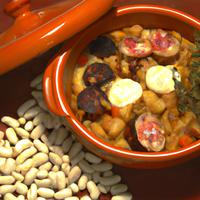
1 serving (350 grams) contains 450 calories, 25.0 grams of protein, 20.0 grams of fat, and 40.0 grams of carbohydrates.

Log this food in SnapCalorie

Nutrition Information
Calories |
304.1 | ||
|---|---|---|---|
% Daily Value* |
|||
| Total Fat | 13.5 g | 17% | |
| Saturated Fat | 4.7 g | 23% | |
| Polyunsaturated Fat | 0 g | ||
| Cholesterol | 33.8 mg | 11% | |
| Sodium | 810.8 mg | 35% | |
| Total Carbohydrates | 27.0 g | 9% | |
| Dietary Fiber | 6.8 g | 24% | |
| Sugars | 3.4 g | ||
| protein | 16.9 g | 33% | |
| Vitamin D | 0 mcg | 0% | |
| Calcium | 67.6 mg | 5% | |
| Iron | 2.0 mg | 11% | |
| Potassium | 540.5 mg | 11% | |
* Percent Daily Values are based on a 2,000 calorie diet. Your daily values may be higher or lower depending on your calorie needs.
Food Attributes
Source of Calories
About Cassoulet de castelnaudary
Cassoulet de Castelnaudary is a traditional French dish originating from the town of Castelnaudary in southwestern France. This hearty stew is a staple of Languedoc cuisine, featuring white beans slow-cooked with duck or goose confit, pork, sausages, and sometimes lamb. Prepared with herbs like thyme, garlic, and bay leaves, it delivers rich and savory flavors. While cassoulet is known for its calorie density, it provides a good source of protein from the meats and fiber from its beans. However, its high fat content, particularly from the duck fat and sausages, makes it a dish best enjoyed occasionally rather than frequently in a balanced diet. Cassoulet’s comforting and nutrient-dense composition reflects the rustic character of French countryside cooking, celebrating tradition over modern dietary constraints.



